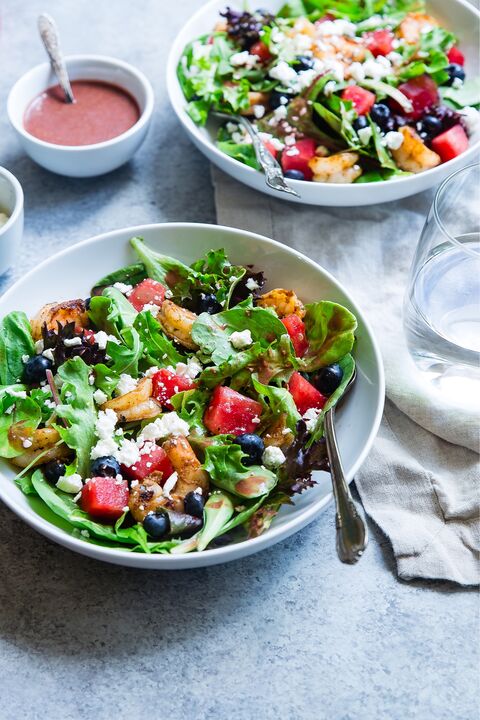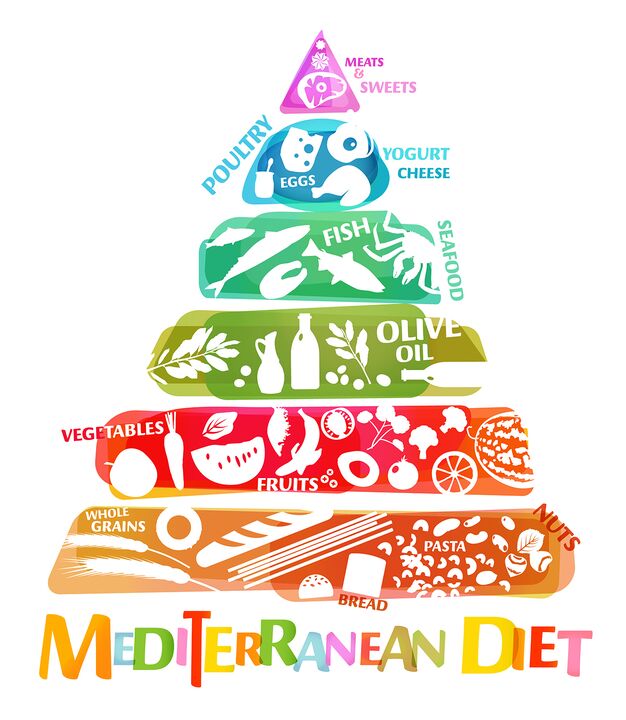
There are no contraindications or strict restrictions on the Mediterranean diet. The most important thing is that the fallen kilograms will not come back. Together with the doctor, we figure out what her secret is.
How the Mediterranean diet works
The popularity of the Mediterranean diet is easy to explain. Scientists have found that due to the particularity of their diet, residents of Mediterranean countries rarely suffer from heart disease and obesity. Although in the usual sense, this is not a true diet, but a set of healthy eating habits unique to the Greeks, Italians, Spanish, and Moroccans. There are no strict restrictions, rules, and numbers. Its main purpose is to teach the body to eat a balanced diet and improve health.
At the same time, the kilogram changes very slowly and smoothly: it may take about six months to see the first results. But there are advantages here. You don't have to go hungry, which means that your body will not feel stressed. This method can keep you in good shape for a long time and prevent future weight gain. Another advantage of this diet is that it can be followed all the time because it allows you to eat delicious, healthy and varied foods.

Foods included in the diet
The Mediterranean diet menu is rich in plant-based foods, lean fish and seafood. It is balanced and contains all the substances important to the body, so it is suitable for almost everyone. You should not try this diet only if you are allergic to certain foods or have an individual intolerance. Nice bonus: Allows to change the menu according to your personal preferences.
- Focus on fresh fruits, vegetables, nuts, legumes and whole grains. They should form the basis of diet. Having said that, try to prioritize the least processed foods, preferably organic foods.
- Reserve red meat and sausages for special occasions. They can be included in the menu up to twice a month. You shouldn't be dazzled by chicken and eggs either. But in fish and seafood, you cannot limit yourself. With such a diet, it is recommended to eat at least twice a day or a week.
- Eat low-fat dairy products and fermented dairy products. The main thing is that they are free of sugar, flavors and fillers.
- Drink plenty of clean, still water. Those who like to drink tea and coffee can enjoy the usual happiness, but don't add sugar to the drink. In addition, if you wish, you can drink a glass of dry red wine every day.
- The Mediterranean diet consists of three meals-breakfast, lunch and dinner. If you feel hungry in the middle, you can eat a handful of nuts, berries, Greek yogurt or fruit.
- With such a diet, you do not need to calculate calories and monitor the proportion of macronutrients that enter the body-protein, fat, carbohydrates. If you decide to dine at the restaurant, please choose seafood or fish. In this case, it is recommended that they be fried in olive oil.
- Don't forget healthy sleep and physical activity-exercise at least 30 minutes a day. Moderate exercise will speed up the weight loss process. In addition, followers of the Mediterranean diet pay special attention to communication with their loved ones. Whenever possible, cook and sit down with your family to cheer up and relieve the pressure that often leads to overeating.
List of main products:
- Vegetables: tomatoes, cucumbers, broccoli, broccoli, zucchini, spinach, onions, potatoes, Jerusalem artichoke, carrots, radishes.
- Fruits and berries: apples, pears, bananas, oranges, oranges, strawberries, grapes, dates, figs, melons, peaches.
- Nuts and seeds: almonds, walnuts, macadamia nuts, hazelnuts, cashews, sunflower seeds, pumpkin seeds.
- Legumes: beans, peas, lentils, peanuts, chickpeas.
- Cereals: whole oats, brown rice, rye, barley, corn, buckwheat, whole wheat bread, durum wheat pasta.
- Fish and seafood: salmon, sardines, trout, tuna, mackerel, shrimp, oysters, shellfish, crabs, mussels.
- Poultry: chicken, duck, turkey.
- Eggs: chicken, quail, duck.
- Dairy products: cheese, low-fat cheese, Greek yogurt.
- Herbs and spices: garlic, basil, mint, rosemary, sage, nutmeg, cinnamon, turmeric, pepper.
- Healthy fats: extra virgin olive oil, olive, avocado and avocado oil.
Some expensive products can be replaced with more affordable and familiar products if necessary. Therefore, you can use regular kefir or homemade yogurt instead of Greek yogurt. Whole grains are replaced by buckwheat, barley, and oatmeal. Trout or tuna is replaced by herring, which contains the same essential omega-3 fatty acids. White cabbage is an excellent substitute for broccoli, and seasonal fruits are perfect for figs and peaches. You can also save olive oil. For example, unrefined sunflower oil contains more omega-6, plant sterols and vitamin E.

Foods to avoid
There are no contraindications to the Mediterranean diet. Nevertheless, the consumption of some foods should be reduced, or even better, completely eliminated. These include sugar, wheat flour, convenience foods, refined butter, spirits, soda, fast food and highly processed foods (chocolate bars, snacks, sausages, sausages). Use dried herbs and spices instead of salt. It is best to gradually give up the usual food-this will help minimize stress on the body.
Weekly menu options
on Monday
- Breakfast: Greek yogurt, fresh berries and granola.
- Lunch: lentil soup and whole wheat avocado sandwich.
- Dinner: Tuna salad with beans, apples and olive oil.
Tuesday
- Breakfast: oatmeal with raisins and honey.
- Lunch: Italian minestrone soup and seafood salad.
- Dinner: Broccoli casserole and natural yogurt.
Wednesday
- Breakfast: Omelet with vegetables, tomatoes and olives.
- Lunch: grilled fish and dried wheat with green beans.
- Dinner: a glass of kefir and a low-fat cheese casserole.
Thursday
- Breakfast: natural yogurt, fruits and nuts.
- Lunch: Whole wheat salmon and avocado sandwich.
- Dinner: stewed chicken breast with cabbage.
Friday
- Breakfast: oatmeal with nuts and honey.
- Lunch: brown rice with eggs, onions and avocado.
- Dinner: seafood pasta and a glass of red wine.
Saturday
- Breakfast: two boiled eggs and fried vegetables.
- Lunch: durum wheat pasta and roast beef.
- Dinner: whole wheat pizza with cheese and vegetables.
Sunday
- Breakfast: steamed cheesecake, fruit and honey.
- Lunch: fish soup and cucumber tomato salad.
- Dinner: vegetable lasagna and a glass of red wine.
The benefits and benefits of the Mediterranean diet
The main advantage of diet is the health benefits. It is no coincidence that nutritionists have given her the status of one of the safest food systems. The results of many years of research prove this point. Here are some scientifically proven facts about how the Mediterranean diet affects the body.

1. Strengthen the heart
In their study, Spanish scientists invited 7, 447 volunteers between the ages of 55-80, who had an increased risk of cardiovascular disease. Three diets were provided for the participants-a Mediterranean diet with extra virgin olive oil, a Mediterranean diet with an emphasis on nuts, and a low-fat diet. Over the next five years, experts monitored the health of the participants.
The results showed that people who followed the Mediterranean diet had a nearly one-third lower risk of stroke and heart attack. According to scientists, this diet helps eliminate "bad" cholesterol in the body and normalize blood pressure and blood sugar levels.
2. Help prevent diabetes
The same scientist tried to find out how the Mediterranean diet affects the development of type 2 diabetes. To this end, they assessed the condition of 418 people who were not sick at the beginning of the study. People who choose the Mediterranean diet are 52% less likely to develop diabetes than those who follow a low-fat diet.
3. Improve intestinal function
According to a study by an international team of scientists, the Mediterranean diet is beneficial to the intestinal flora. Experts monitored the health of 612 people aged 65-79 from Poland, the United Kingdom, the Netherlands, France and Italy. The subjects followed the Mediterranean diet for one year. As a result, their bacterial diversity lost more slowly, and the number of "good" bacteria and beneficial fatty acids increased. At the same time, the number of chemicals that cause inflammation and the bacteria involved in the formation of bile acids has decreased.
4. Extend lifespan
Cardiologists at the University Hospital of Saint-Etienne (France) found that the Mediterranean diet can reduce the risk of premature death. The study involved 605 people who had a heart attack six months ago. They also received two food options-a low-fat diet and a Mediterranean diet. The researchers monitored the patient's health for four years. In the Mediterranean diet group, the risk of death from all causes was reduced by 45%, and the risk of heart disease was reduced by 70%.
5. Helps lose weight
In the Mediterranean diet, you can normalize your weight without counting calories. This is the conclusion reached by scientists at the Second University of Naples. The study involved 99 men and 81 women. They are divided into two groups. One is required to comply with the recommended ratios of protein, carbohydrates and fats, and the other-increase consumption of whole grains, nuts, fruits, vegetables, and olive oil. Two years later, the scientists evaluated the results: In the Mediterranean diet group, the weight lost three times.
The research of Canadian experts confirms this point. According to him, the effect of the Mediterranean diet is no less than that of a low-carbohydrate diet. With its help, you can lose up to 10 kg per year. If you want to speed up your weight loss, please calculate your calorie intake and stick to it when formulating your menu.
Italian doctors conducted another large study involving 32, 119 volunteers. For the past 12 years, all participants have adhered to the principles of the Mediterranean diet. Facts have proved that long-term adherence to this diet can reduce the risk of weight gain and abdominal fat accumulation within five years after stopping the diet.

Doctor's opinion
Are there any disadvantages to the Mediterranean diet?
The principles of the Mediterranean diet conform to the recommendations of the World Health Organization. It is rich in vegetables and fruits, correct complex carbohydrates, healthy monounsaturated fatty acids, and complete protein. The restriction only applies to fast carbohydrates, fast food, convenience foods and foods rich in trans fats. People who eliminate such foods and follow the principles of the Mediterranean diet, in most cases, begin to lose weight. The process is not fast, but it is the best. Losing weight quickly is bad for your health.
Because the Mediterranean diet requires a lot of vegetables, fish, seafood, and high-quality vegetable oils, the vegetable basket will be more expensive. But health is not worth saving. Because balanced nutrition is the key to harmonious development.
Dry red wine is considered to be one of the most important components of the Mediterranean diet, which explains its benefits. Really? How much alcohol is safe?
Generally speaking, it is safe not to exceed 150 ml of wine per day for women and 200 ml for men. It is best not to drink this amount at once, but to dispense it throughout the day. Drinking wine is not an important part of the Mediterranean diet. If you have liver or heart problems, or if you cannot control your alcohol intake, you can and should ignore it. On the contrary, wine is part of geographic tradition.
Who should not try this diet?
The Mediterranean diet has a wide range of uses. There are no strict contraindications due to a balanced and diverse diet. However, due to the high fat content, people with liver or gastrointestinal diseases should use this type of diet with caution. You should consult your doctor in advance. Of course, it should be limited to people who have allergic reactions and intolerances to the foods used in their diet.
Some doctors recommend a Mediterranean diet to prevent coronavirus. Is this reasonable?
In order to resist viral infections, it is important to pay attention to immunity. The activity of the immune system directly depends on what we eat. If your diet is balanced, rich in vegetables and fruits, you eat enough fiber, don't neglect grains and legumes, get complete protein and all essential fatty acids-your body will be more likely to fight infections. The Mediterranean diet meets all these requirements. Therefore, it can be used not only to prevent coronavirus, but also to prevent other viral diseases.




























